One of the most crucial aspects of my design process was prototyping and playtesting the game as early as possible. For To Our Health, I was able to hold 2 mini online test during studio as well as 4x 2.5 hour playtest sessions that I was able to gain a vast amount of feedback on.
Due to COVID-19, I was not able to hold as many as I intended, however the young adult participants were selected if they had previously or currently are learning about topics such as complexity, systems thinking, futuring etc. or were avid gamers to represent a sample of the key audiences I identified.
During these playtests I remained an observer, taking notes and recording things like which prompts were chosen, how long rounds took, interpretation of rules and interactions between players. I only stepped in to clarify things if completely necessary, or to ask/workshop/refine things that I had questions about. Consent was gained prior to beginning the playtests and feedback + reflections were also gathered at the end of each playtest.
Some of the insights and refinements made from the playtest are:
1. Iterate the rules several times to make them more concise and comprehensible.
2. Realise very quickly that an online implementation of this would not be anywhere near as successful.
3. Implement the intervention mechanic through chance in a more meaningful way.
4. Create the Sign Cards as a mini-intervention for the players between players.
5. Balance and adjust wording of prompts as well as intensity of some prompts.
By the end of the playtests, based on feedback, it was clear that players had a better understanding of how all these different aspects in the world impacted parts of peoples’ health and wellbeing.
What was most insightful however, was the richness of the worlds they built in these sessions.
Outcomes - Example Worlds
The City of Naturalists
This playtest shown below is a snippet of the richness and detail the players went into in the 2.5 hours of time allocated to them with the most recent iteration of the rules.
From this playtest I was able to confirm the use of the scale system for the intervention system as well as the Sign Cards as effective mechanics within the gameplay. I also discovered that assigning people aspects of the framework became too confining and was often forgotten, and so was removed from the game.
Hope you enjoy their city's story!
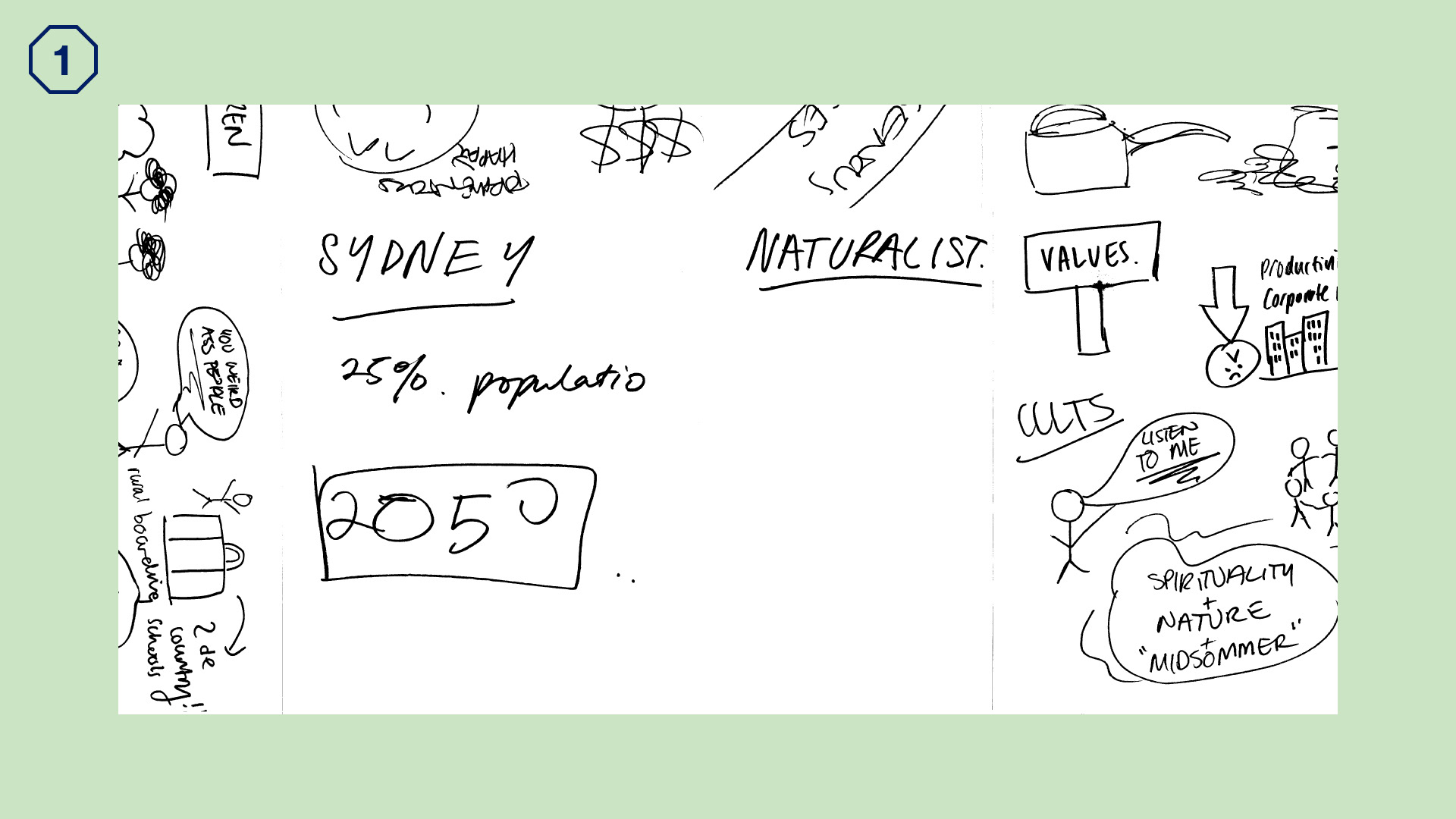
Sydney 2050, 25% of the population affected by 'The Trait' of 'Naturalist'

A sense of purpose and meaning is found in nature. Massive mental and spiritual dissatisfaction found in places, jobs and activities that are disconnected from nature.
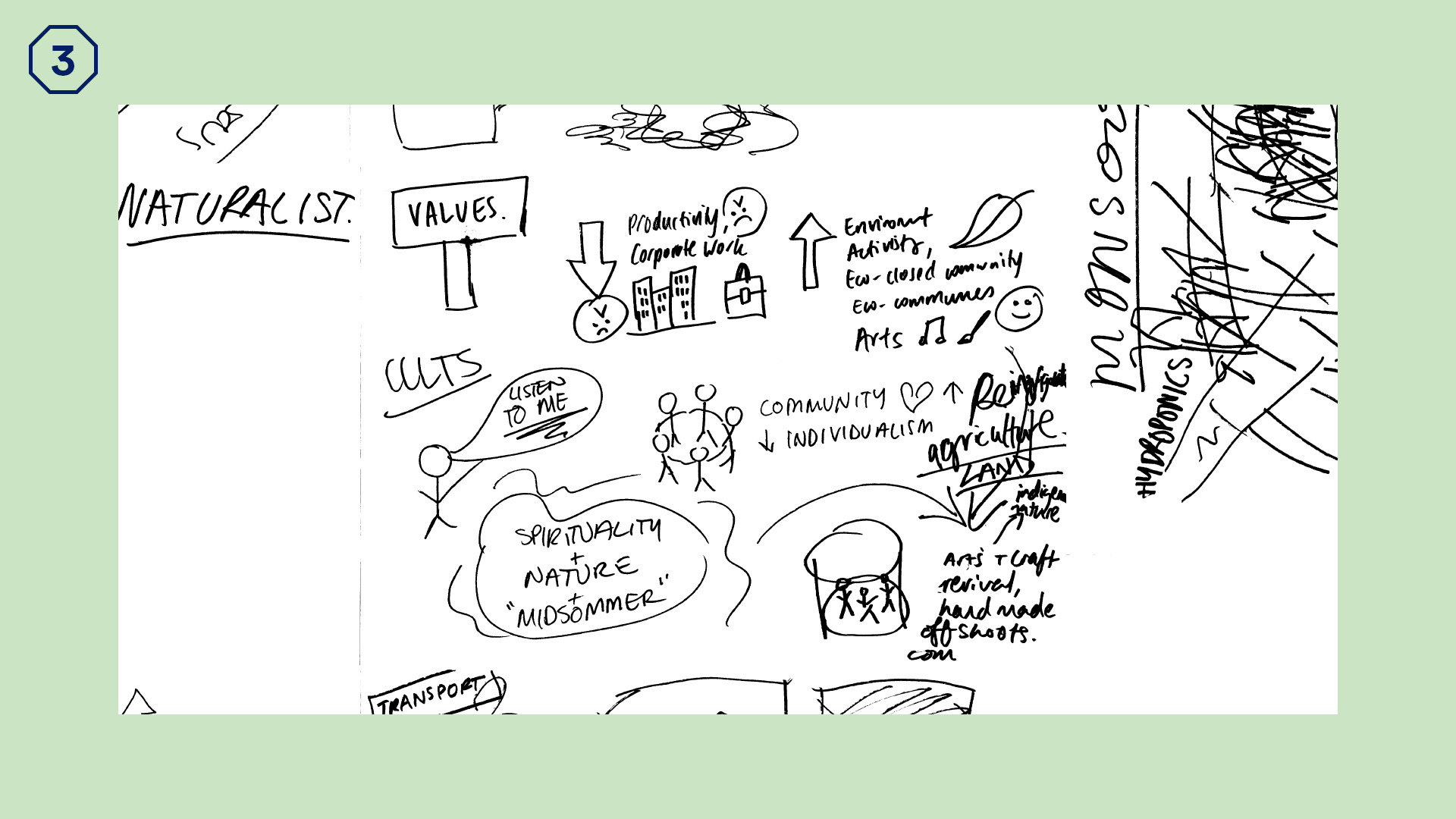
In this world, ‘the Naturalists’ as they called them, who suddenly appeared broke down many social relationships and family units in their crazy obsession with nature preferring to form eco communities on the outskirts of the city, growing their own produce and food.
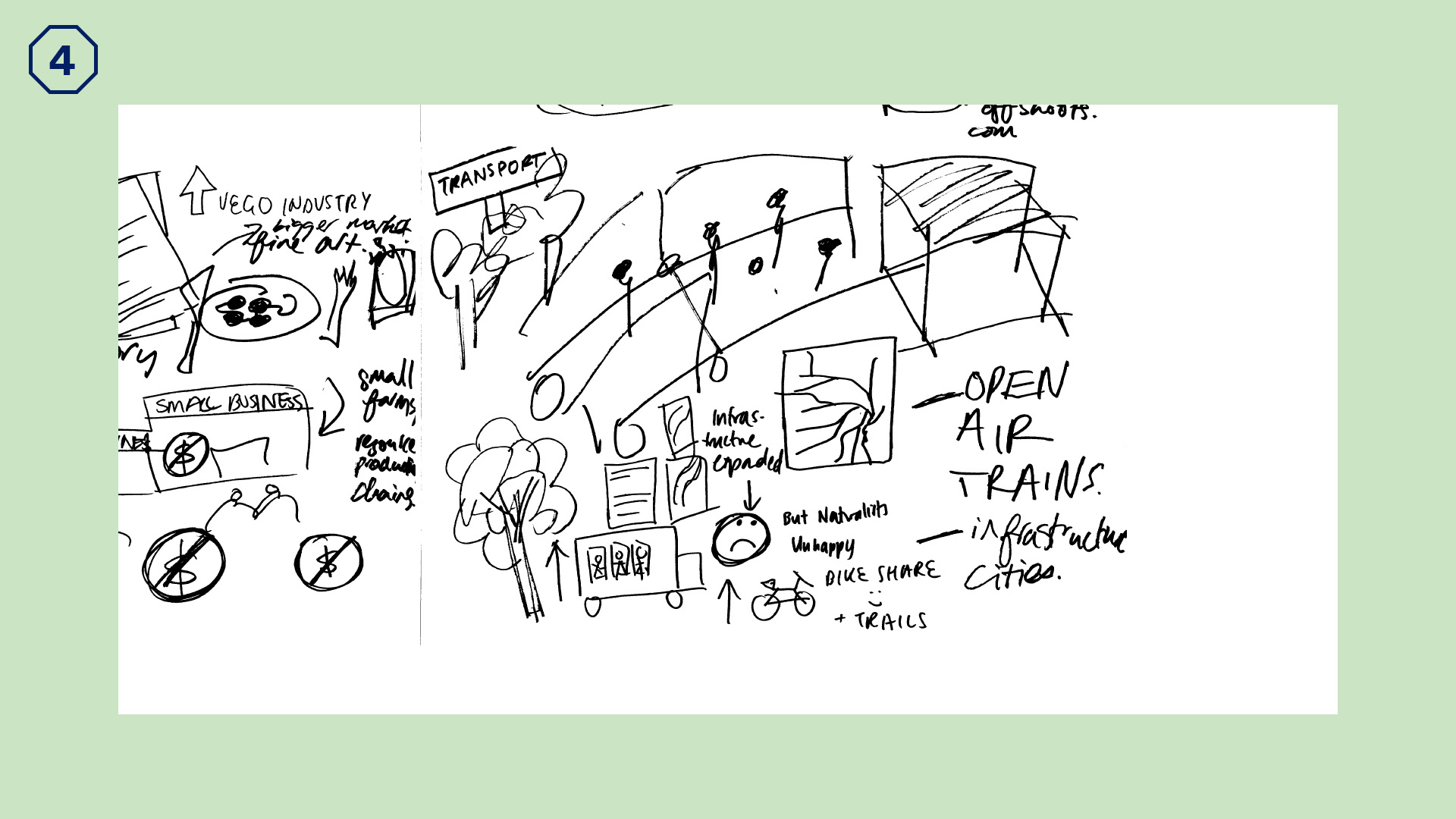
Those who could withstand living in the dense parts of the city resided near green spaces and preferred cycling or the open air trains.
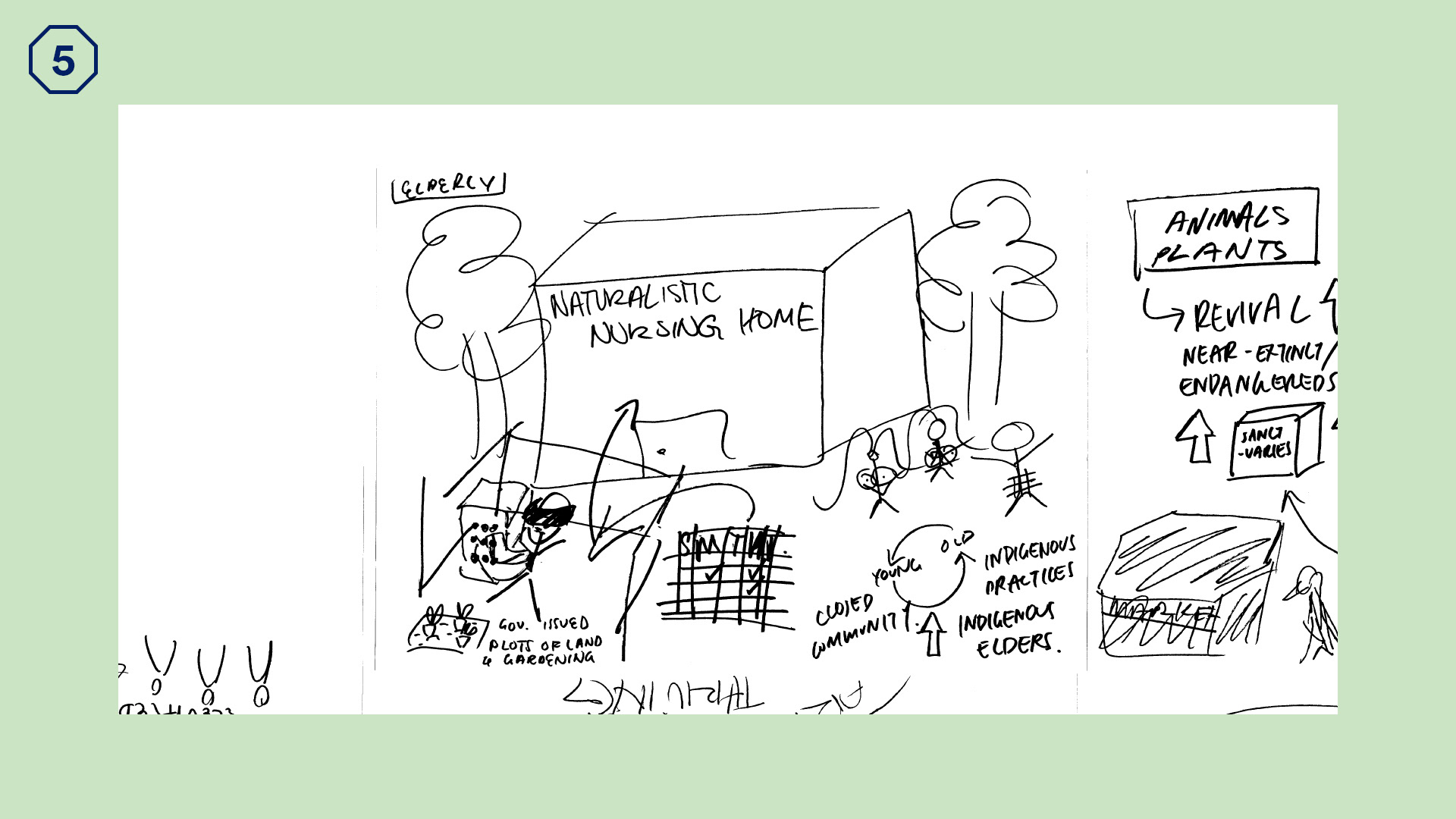
The elderly Naturalists became more active, taking up responsibility of the inner city community gardens whilst many of working age found their life purpose in the environmental or agricultural sciences.
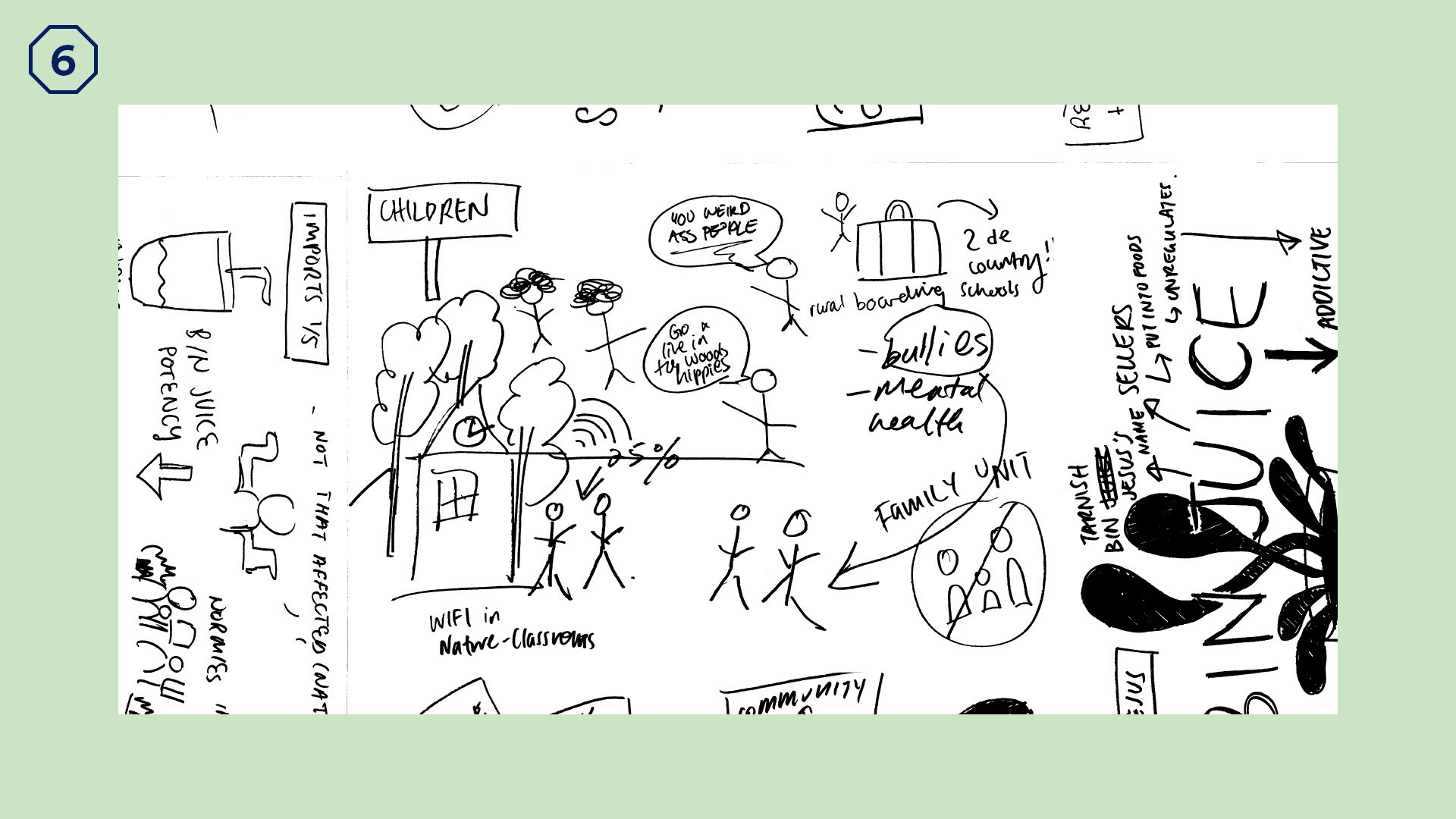
Schools had to adapt curriculums to spend more time outside and new architectural systems were invented to better accommodate for green spaces.
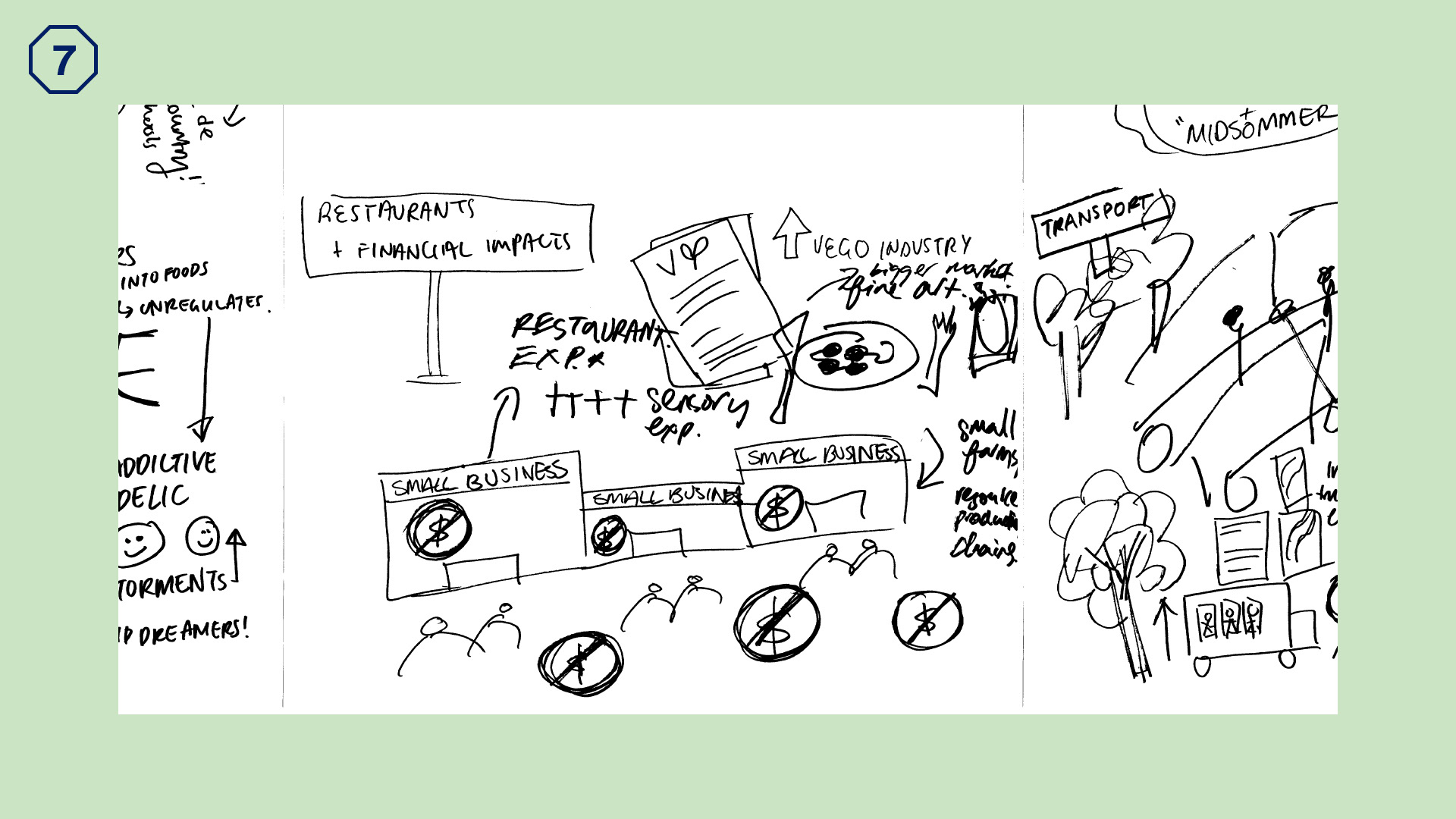
Not all was well though, as parts of the city believed them to be deranged with their sudden obsession with nature as small businesses struggled with the loss of productivity.
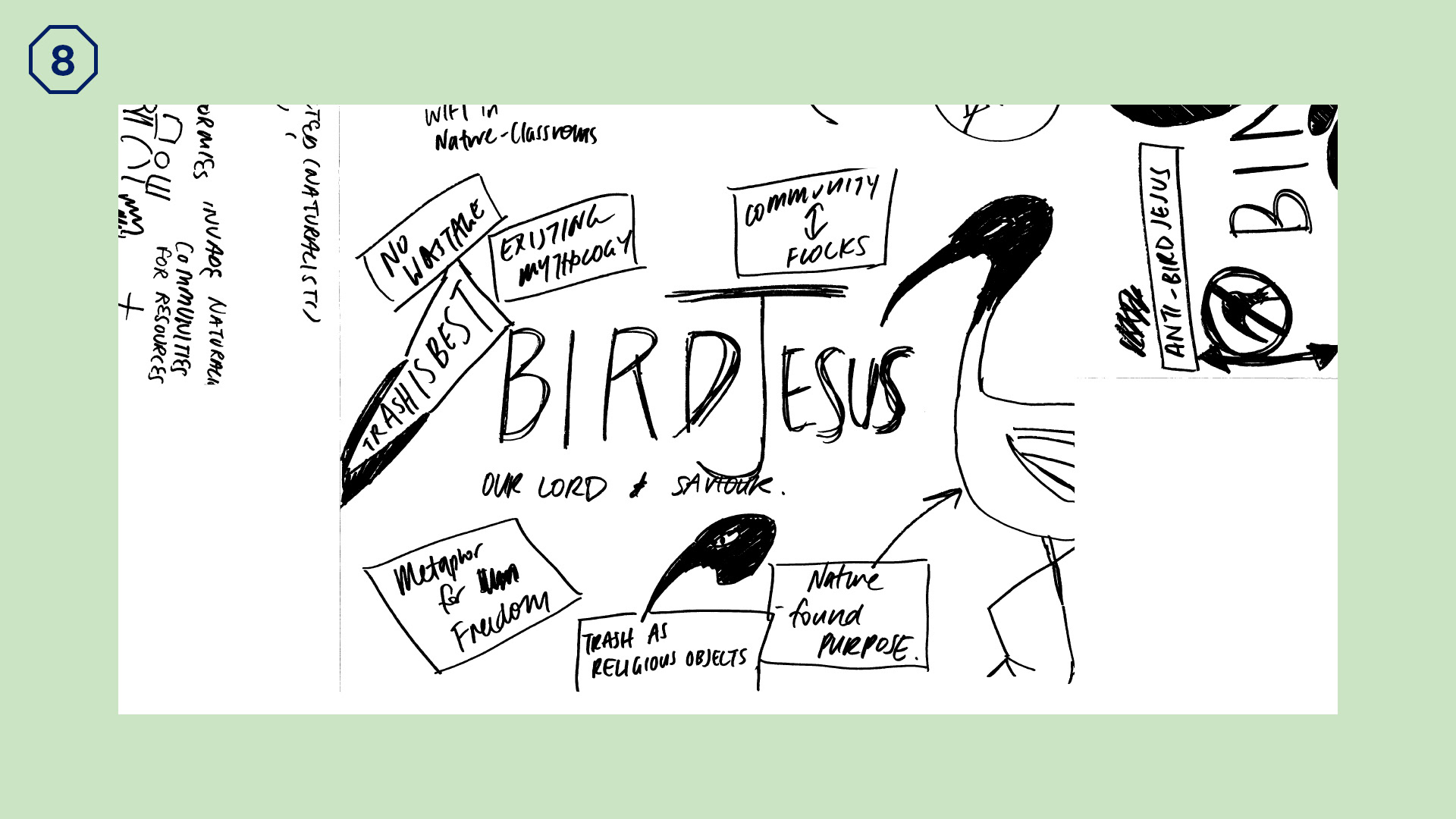
The Naturalists also pushed hard against the government to make use of trash, where a new belief system was established for worshipping the holy bin chicken, Bird Jesus - to represent their ideology of being in nature with no wastage.
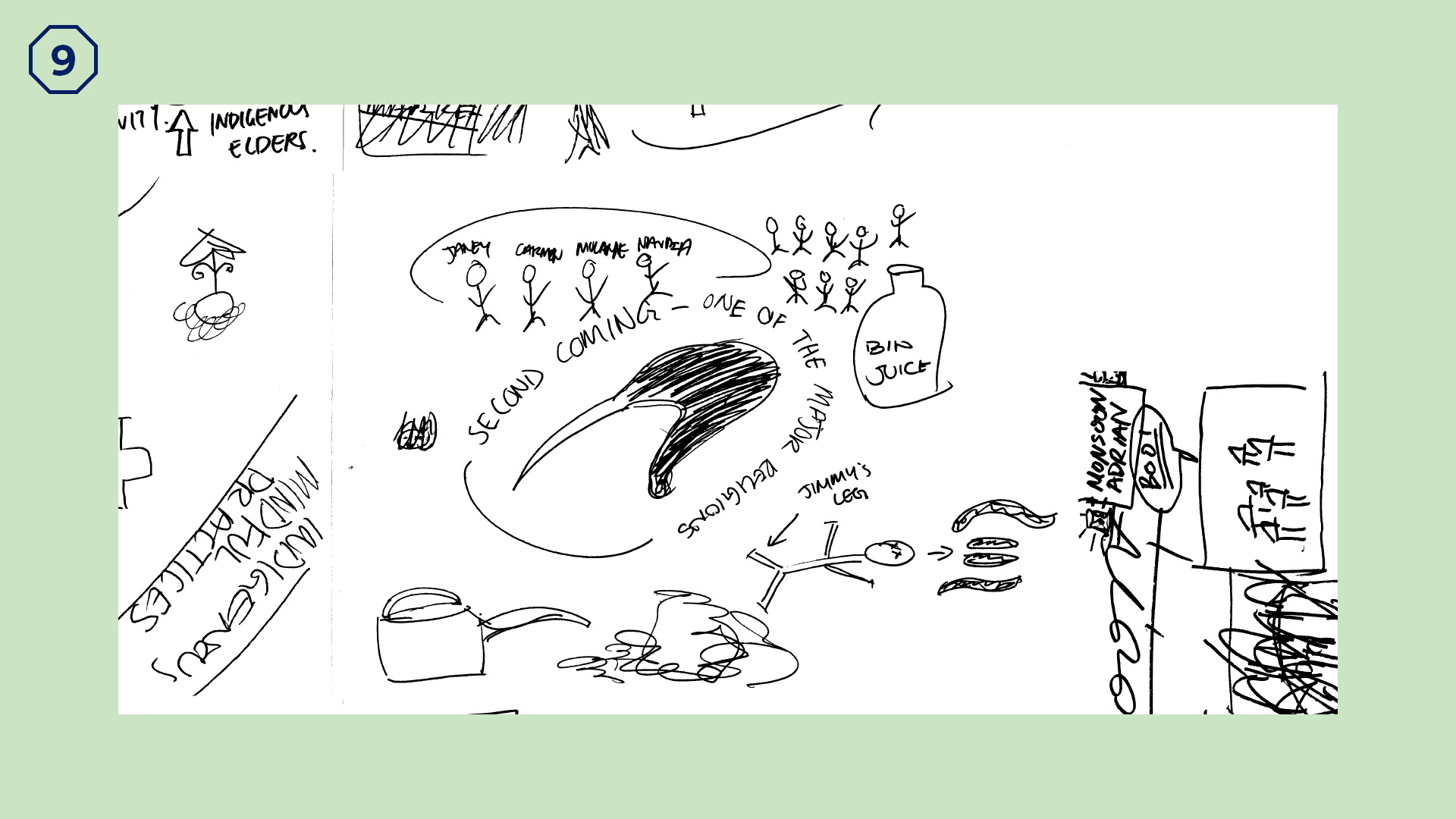
During the Simulation, the city was struck multiple times by disaster, resulting in the city only barely succeeding in implementing hydroponics, however a faction of the cult experimented with using bin juice as a nutrient source, resulting in mutant crops that were discovered to be psychedelic.
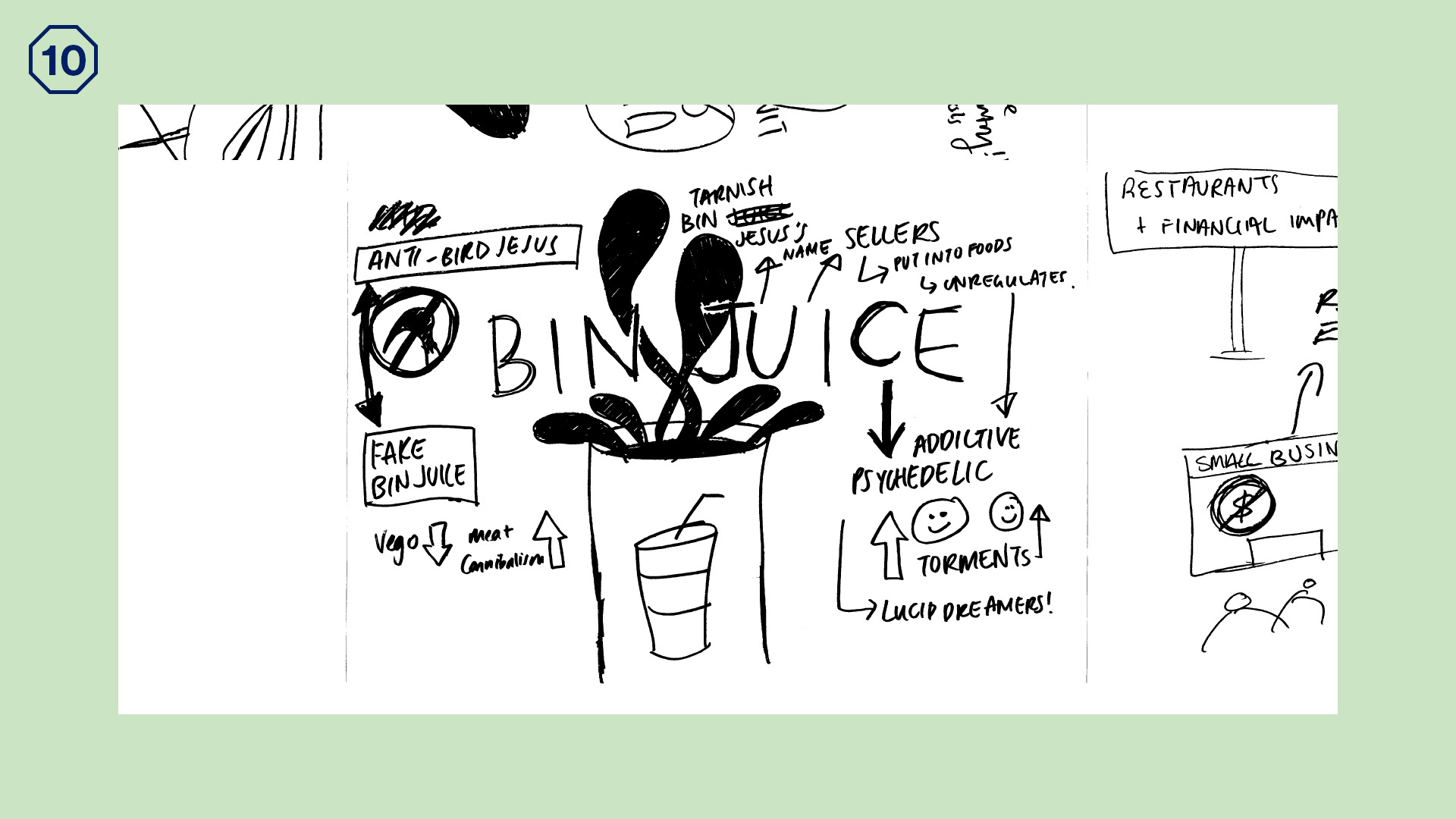
This, alongside the natural disasters and extreme weather conditions that led to the death of vast swathes of plants and animals, resulted in the growth of a black market for the new psychedelic drug to escape reality. All the while, the remaining 75% of the population became dependent on the Naturalists for food as the supply chains into the city were destroyed, and thus took up the values of the Naturalists in their saving of the city.
Naturalist Trait:
"A sense of purpose and meaning is found in nature.
Massive mental and spiritual dissatisfaction found in places, jobs and activities that are disconnected from nature."
Naturalist City, Sydney 2050 Full Story
In this world, ‘The Naturalists’ as they called them, who suddenly appeared broke down many social relationships and family units in their crazy obsession with nature preferring to form eco communities on the outskirts of the city, growing their own produce and food. Those who could withstand living in the dense parts of the city resided near green spaces and preferred cycling or the open air trains.
The elderly Naturalists became more active, taking up responsibility of the inner city community gardens whilst many of working age found their life purpose in the environmental or agricultural sciences.
Schools had to adapt curriculums to spend more time outside and new architectural systems were invented to better accommodate for green spaces.
Not all was well though, as parts of the city believed them to be deranged with their sudden obsession with nature as small businesses struggled with the loss of productivity.
The Naturalists also pushed hard against the government to make use of trash, where a new belief system was established for worshipping the holy bin chicken, Bird Jesus - to represent their ideology of being in nature with no wastage.
During the Simulation, the city was struck multiple times by disaster, resulting in the city only barely succeeding in implementing hydroponics, however a faction of the cult experimented with using bin juice as a nutrient source, resulting in mutant crops that were discovered to be psychedelic.
This, alongside the natural disasters and extreme weather conditions that led to the death of vast swathes of plants and animals, resulted in the growth of a black market for the new psychedelic drug to escape reality. All the while, the remaining 75% of the population became dependent on the Naturalists for food as the supply chains into the city were destroyed, and thus took up the values of the Naturalists in their saving of the city.
Early Playtest
I'd like to also share an earlier playtest that I ran, as this playtest was important as it allowed me to pivot how the concept of the 'Interventions' as a mechanic in the game. Originally, these were meant to be ongoing projects that would eventually tick down (using the dice for keeping track) however this was found to be too confusing and didn't push the players to make decisions that aligned with their goal as a task force.
As such mid playtest session we redesigned this implementation by adding chance and to the interventions with a pass/fail dice roll. This inherently added risk to the game, incentivising more thought out decisions and preventing players from using catch-all solutions. This was further refined into the 6-scale system during later playtests, however this playtest was the driver for it.
Empath Trait:
"Ability to completely perceive, understand and feel what other
living beings are experiencing from their position.
living beings are experiencing from their position.
Difficulty in distinguishing self perceptions versus others."
Empath City, Sydney 2050, Full Story
When 25% of the population suddenly became extreme Empaths, values on food dramatically changed. Those with The Trait were found to empathise with both animals and plants, leading to a surge in lab grown meats and pill substitutes to feed the city instead.
Empath only schools and classes were created, leading to the innovative curriculum centred upon mindfulness. Prescribed medications were given to Empath children to reduce the overwhelming effects of losing one’s sense of self perception.
Some Empaths quickly discovered their obsession on the Internet as Social Media megacorporation Tik Tok was sponsoring Empaths to manipulate consumers into buying more products with their heightened abilities to understand their audience. Others who attempted to permanently detox from the digital world did so in vain, as The Internet of Things dominated everything, skyrocketing their mental health cases.
Empaths became particularly successful in the field of psychology joining the two forming schools of thought regarding treatment of mental health - medication through drugs and naturalistic through mindfulness and self help. Other Empaths turned to the Arts industry, or human-facing jobs as they were highly sought after, perpetuating new hiring biases.
Reports on social media surged as they cited the most wholesome and the most toxic stories about being in a relationship with an Empath. Meanwhile, social services were strained as family units with those suddenly affected by The Trait suffered massive relationship shifts.
During the Simulation, as the divide between Empaths and non-Empaths widened, the release of a AAA Virtual Reality Box Office Film about life experiences of Empaths served to lessen the divide.
However this was all for naught, as the news cycle caught wind of a schoolfight between an Empath and non-Empath sparking debate on the danger and manipulative capacity of Empaths. Leading the debate were outraged parents who perceived the numerous concessions given to Empaths as giving them an unfair advantage over others. Government trust was already low, but took another blow as the Task Force failed to gain traction on the Empath + Non-Empath Student Experience Day.
At the height of tensions, protests broke out in the streets over the hiring bias towards Empaths, so the Task Force quickly and successfully implemented a quota system quelling the protests but leaving bitter tastes in the mouths of all.